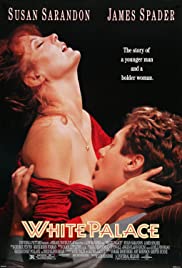
WHITE PALACE
US, 1990, 103 minutes, Colour.
Susan Sarandon, James Spader, Jason Alexander, Kathy Bates, Eileen Brennan, Renee Taylor.
Directed by Luis Mandoki.
White Palace is a surprise. On the surface, a wry story of a 27-year-old executive widower falling in love with a 43-year-old burger outlet waitress (James Spader and Susan Sarandon) - with a few comparatively explicit sexual encounters. But the performances are so persuasive and the writing has a great deal of insight so that we are taken into the experience of the couple, the passion, the tension and the transformation. Susan Sarandon emerged during the '80s as a strong character actress (Atlantic City, Bull Durham), finally winning an Oscar in 1995 for Dead Man Walking. James Spader won Best Actor award at Cannes in 1989 for Sex, Lies and Videotape.
There are some excellent cameos, especially from Eileen Brennan as Sarandon's eccentric psychic sister; Renee Taylor does a touch of a caricature Jewish mother.
The story and the treatment are often quite frank, but there is valuable exploring of characters, relationships and commitment. (The screenplay was co-written by Alvin Sargent, writer of such films as Love and Pain, Kramer vs Kramer).
1.Portrait of relationships, passion, commitment, love?
2.The St Louis locations, affluent society and apartments, the downtown background, the burger outlet? New York settings? The musical score, the lyrics of the songs echoing the themes of the film?
3.The title, the burger restaurant - and the ironies of a palace? The meeting-place for Max and Norah?
4.Audiences identifying with the characters, their experiences, crises? Authentic? The theme of difference in age? The younger man? Love, circumstances controlling relationships?
5.James Spader as Max: the introduction, driving, changing into the tuxedo, looking at himself in the mirror, his neat apartment, his precision, everything in order? His friends, going to the party, the ordering of the hamburgers, going back on principle with the empty boxes? The encounter with Norah and his standing on dignity? The party, his slides, his dead wife looking out at him? Widower, melancholy? Self-pity? Giving up teaching, his work? The visit to his wife's grave with his mother? His mother's nagging, phone calls, his resistance to her? His driving, going for the drink, the chance encounter with Norah, the reactions in the bar, alerted with the story of her dead child, her laugh at his plight? Going home, her untidy house, feeling ill? The sexual dream of his wife, the encounter with Norah, its effect on him? His friends concerned about his dates and relationships? Leaving - and tidying up? Going to work? The contrast with his apartment and Norah's house? His return, allegedly fixing the letterbox after the crash? The encounter, the friendship, passion, love? Their going out together, his being late for his work and interview with his boss? Neil and Rachel and his mother on the phone? His buying the vacuum cleaner - and her reaction? Norah tidying the house? Flowers and gifts? The change in him, his clothes, spilling things, late? The visit of Judy, the talk, reading his palm, precognition - and his not experiencing anything like this? The truth about Charlie's death? The supermarket and his precision, meeting Rachel, protecting Norah from Rachel? His lies about going to the wedding, the joy of the wedding, returning to Norah and her attack on him for lying? The thanksgiving invitations, Norah going to his apartment, wanting to know the rent? The decision to go, the socialising, introducing her, the strong arguments at the meal, her walking out and his following? Her disappearance, the note, not wanting him to follow? Reassessing his life? Going to New York, giving up everything, going back to teaching, his self-centredness, his commitment to Norah? Their future?
6.Norah, age, experience, at work with the burgers, shouting Max down, in the bar, looking for somebody, the seductive encounter, laughing at him, her story about her son? Taking him home, sex? His return? The relationship, love and passion? His making her feel beautiful, her self-worth? The supermarket and her embarrassment? Judy's visit and her memories of Judy leaving her? The lies about the wedding? The upset about the vacuum cleaner? Getting ready for the dinner, the drink, the talk, smoking in the bathroom, exchanging criticism with the woman in the bathroom - and her being told off? The argument at the table, working class, her decision to leave? Disappearance, going to New York, seeing Max, his coming into the restaurant, her not wanting him to stay, his declaration, her love? A future?
7.Judy, odd, the psychic, the story about leaving Norah in the past? Reading Max's hand, the experiences of precognition - and her understanding him? Welcoming him in New York?
8.The memory of his wife, the photo, her appearing in the dream, his love, the grave? Self-pity? Norah's attitude towards his wife? Wanting Norah more than his wife?
9.Neil and Rachel, the party, the bucks' night, the wedding and celebration, Rachel and the supermarket, the phone calls, the Thanksgiving meal and their welcoming Max and Norah? Trying to control his life? Rachel and Neil trying to advise Max at the end, his ignoring them and their puzzle?
10.The Thanksgiving guests, Norah meeting them, their own life, affluence and interests? The mealtime discussion, politics?
11.Max's mother, the Jewish mother, on the phone, at the cemetery and cleaning up the grave, going to the Thanksgiving dinner, criticisms of Norah, making the mess, leaving with Max?
12.The theme of the young man with the older woman? Relationships, crises, new outlook and possibilities? Self-worth, change? Responsibility for commitment?